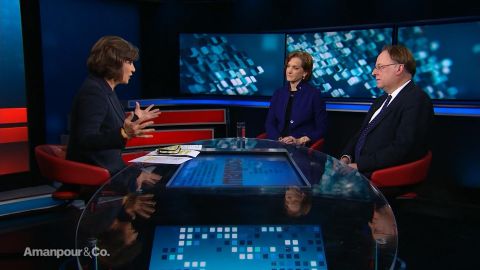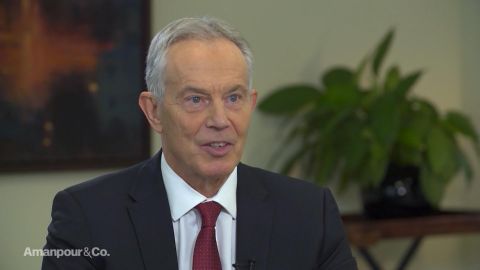Read Transcript EXPAND
CHRISTIANE AMANPOUR: So, they say that the last time the map of England, the map of Great Britain shifted so seismically in this political manner was when you won in 1997, and the whole political map shifted. What do you say to what happened this time around?
TONY BLAIR, FORMER BRITISH PRIME MINISTER: So, this time around, I think it was very simple, the Labour Party had moved to a far-left position. It had ideas, and actually, an ideology that was never going to be supported by your traditional Labour voters. And of course, you had Brexit. So, the combination of those two things meant that the Labour Party, which had, frankly, a sort of indecisive position on Brexit and then a far-left leadership that was unacceptable to our traditional support. That’s your explanation. And actually, you don’t need to be a political genius to see it. You need to talk to — be on about five doorsteps before you realize it.
AMANPOUR: It was also personality. I mean, I know you’ve talked about a hard-left move in the Labour movement, the Labour Party, but it was also about personality. I guess, do you think a new person is enough to change Labour’s electoral fortunes?
BLAIR: Absolutely not. So, if Labour makes the mistake of thinking this was just the rejection of Jeremy Corbyn, it was the rejection of what he personified as a set of politics. So, in the end, the reason why we lost, the rejection, was the rejection of a set of political ideas. It wasn’t just of a person. Actually, it’s a person, you know, you can say he’s sincere in his beliefs, he believes in what he believes in. That’s fine. But what he believed was a combination of far-left economic policy harking back to the ’60s and ’70s, and hostility to the West in foreign policy that people were never going to vote for. The people in constituencies like the one I used to represent, has now gone Conservative. They were never going to support that kind of politics
AMANPOUR: Everybody knows U.S. and global audience knows that you were one of the main grandees, so to speak, who supported remain and who wanted to reverse Brexit, and you did everything you could to do that, whether it was going to be a second referendum or whatever it was. Are you ready to concede that that is off the table, that Brexit will happen, and that’s what’s going to happen to the United Kingdom?
BLAIR: Yes, it’s going to happen now. I mean, it’s tragic. We should never have agreed to Brexit general election. By the way, it was crazy to mix the two issues up. We have should have had a decision by the British people on Brexit, self-standing as a decision, but we didn’t. One of the many mistakes the Labour Party made was to agree of Brexit general election. It’s now decided. The government has a majority to do Brexit, which will happen at the end of January. It’s then going to be a very difficult negotiation. But you know, it is now important that we accept it will happen and try and make it work as best we can.
About This Episode EXPAND
Former Prime Minister Tony Blair joins Christiane Amanpour to examine the deeply partisan politics rocking the U.K., screenwriter and director Greta Gerwig tells Michel Martin about her adaptation of “Little Women” and Michael Crick and Anne Applebaum discuss tensions between the U.K.’s Conservative Party and the British media.
LEARN MORE


